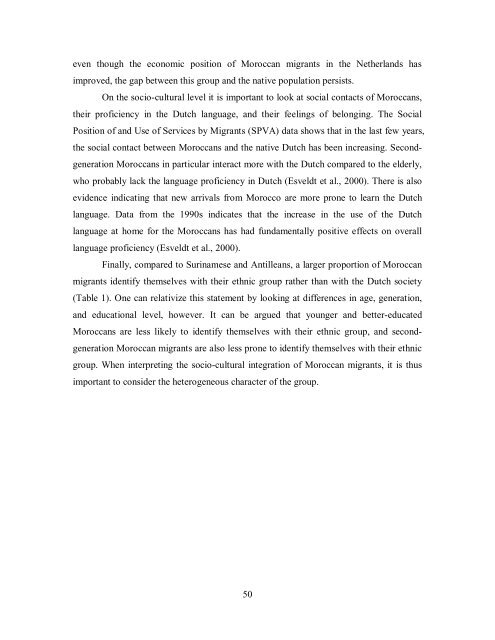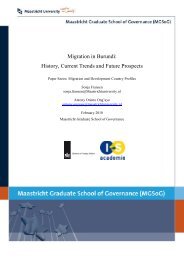Migration in Morocco: History, Current Trends and Future ... - MGSoG
Migration in Morocco: History, Current Trends and Future ... - MGSoG
Migration in Morocco: History, Current Trends and Future ... - MGSoG
Create successful ePaper yourself
Turn your PDF publications into a flip-book with our unique Google optimized e-Paper software.
even though the economic position of Moroccan migrants <strong>in</strong> the Netherl<strong>and</strong>s has<br />
improved, the gap between this group <strong>and</strong> the native population persists.<br />
On the socio-cultural level it is important to look at social contacts of Moroccans,<br />
their proficiency <strong>in</strong> the Dutch language, <strong>and</strong> their feel<strong>in</strong>gs of belong<strong>in</strong>g. The Social<br />
Position of <strong>and</strong> Use of Services by Migrants (SPVA) data shows that <strong>in</strong> the last few years,<br />
the social contact between Moroccans <strong>and</strong> the native Dutch has been <strong>in</strong>creas<strong>in</strong>g. Second-<br />
generation Moroccans <strong>in</strong> particular <strong>in</strong>teract more with the Dutch compared to the elderly,<br />
who probably lack the language proficiency <strong>in</strong> Dutch (Esveldt et al., 2000). There is also<br />
evidence <strong>in</strong>dicat<strong>in</strong>g that new arrivals from <strong>Morocco</strong> are more prone to learn the Dutch<br />
language. Data from the 1990s <strong>in</strong>dicates that the <strong>in</strong>crease <strong>in</strong> the use of the Dutch<br />
language at home for the Moroccans has had fundamentally positive effects on overall<br />
language proficiency (Esveldt et al., 2000).<br />
F<strong>in</strong>ally, compared to Sur<strong>in</strong>amese <strong>and</strong> Antilleans, a larger proportion of Moroccan<br />
migrants identify themselves with their ethnic group rather than with the Dutch society<br />
(Table 1). One can relativize this statement by look<strong>in</strong>g at differences <strong>in</strong> age, generation,<br />
<strong>and</strong> educational level, however. It can be argued that younger <strong>and</strong> better-educated<br />
Moroccans are less likely to identify themselves with their ethnic group, <strong>and</strong> second-<br />
generation Moroccan migrants are also less prone to identify themselves with their ethnic<br />
group. When <strong>in</strong>terpret<strong>in</strong>g the socio-cultural <strong>in</strong>tegration of Moroccan migrants, it is thus<br />
important to consider the heterogeneous character of the group.<br />
50



